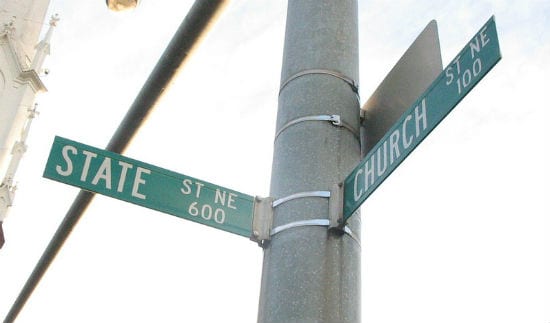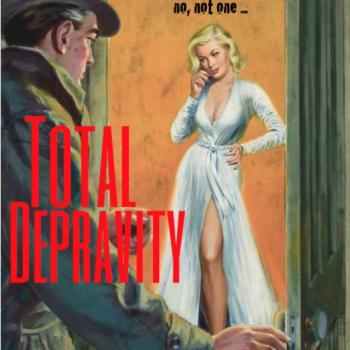Originally posted October 12, 2010.
You can read this entire series, for free, via the convenient Left Behind Index. The ebook collection The Anti-Christ Handbook: Volume 1 seems to have disappeared from Amazon. I’m trying to figure out how to get it back on there. Stay home.
Tribulation Force, pp. 274-277
Well here I am and there you are. Since you’re not here, you must be elsewhere.
This kind of basic binary distinction is a necessary and useful tool for making sense of the world. We need words to mean things, meaning we need them not to mean everything else too. So if you’re not here, you must be elsewhere because this is what “elsewhere” means. (It’s also, in a way, what “here” means, i.e., not elsewhere.)
But while such necessary distinctions can be useful, they can also produce confusion if we forget the rather important ways in which the categories they create are different. “Here” is singular and particular while “elsewhere” is vast and diverse. (You’re all, plural, reading this elsewhere, but I shouldn’t assume that means you’re all crowding around a single monitor somewhere.) “X” marks the spot, a single spot, but “Not X” marks everything else. “Not X” is the rest of the universe.
Of course. No duh. Why, you may be wondering, am I wasting our time with such an elementary and obvious discussion? Who could possibly be confused about something so simple?
Who else? Tim LaHaye and Jerry Jenkins. And any of their readers and fans who manage to get through this next section of Tribulation Force without laughing hysterically at the crazed absurdity of it.
This weirdly laughable confusion is the premise of this section and of much that follows it. LaHaye seems to believe that “elsewhere” is a single location. He believes that “Not X” marks the spot. He believes, specifically, that all of those left behind — every believer and non-believer who subscribes to anything other than his very specific variety of real, true Christianity — believes one thing and the same thing. All of them. All of us. Christopher Hitchens and Muqtada al-Sadr and you and me and the Dalai Lama — we all believe Not X and so, to LaHaye, we are all the same and must agree wholly on every other point.
This singular uniformity of Not X is essential to the plot of LaHaye’s story because it is essential to the fulfillment of his supposed prophecy. If his prophecy is true, then we must all be identical and uniform.
That also means, of course, that if we are not all identical, then LaHaye’s prophecies as described in these books cannot be true.

That makes this a rather important section of these books, a passage that provides the opportunity to disprove LaHaye’s claims without having to wade into the deep weeds of the Bible’s apocalyptic imagery. We don’t need to become experts on Daniel and Revelation to demonstrate that Tim LaHaye’s reading of them is bogus. All we need to do is to show that, for example, Tom Cruise and Richard Dawkins don’t share a uniform belief system.
You’ll recall that Buck has just eaten his Symbolic Cookie at Cardinal Mathews big press conference with religious leaders from around the work. Buck was too focused on his cookie-sex to pay much attention to the substance of the press conference, but post-cookie he suddenly realizes that what is being announced is “a proposition of incredible significance.”
They were announcing not only an effort to cooperate and be more tolerant of each other, but also the formation of an entirely new religion, one that would incorporate the tenets of all.
This is one of those wonderful sections of the book where your eyes scan the text faster than your brain can articulate its disbelief. If these folks are forming an entirely new religion, why do they need to be “more tolerant of each other”? They’re not really “each other” any more are they? And how could this new religion possibly incorporate the tenets of all when so many of those tenets are explicitly constructed in opposition to one another? This new religion must be simultaneously Trinitarian and anti-Trinitarian, must simultaneously hold that the Mahdi has already come, has not yet come, and doesn’t even exist — how does that work?
But before the howling awful wrongness of this paragraph is able to fully sink in, you’re already reading the next one:
“And lest that sound impossible to the devout members of each of our sects,” Mathews said, “we are all, every one of us, in total unanimity. Our religions themselves have caused as much division and bloodshed around the world as any government, army or weapon. From this day forward we will unite under the banner of the Global Community Faith. Our logo will contain sacred symbols from religions that represent all, and from here on will encompass all. Whether we believe God is a real person or merely a concept, God is in all and above all and around all. God is in us. God is us. We are God.”
One world religion. Those who had previously worshipped many Gods in many ways must now all worship the same God in the same way. Must. Oh, and “we are God.”
And just like that, the world would be in flames.
Cardinal Mathews wouldn’t survive the week. Every other religious leader on that platform would be forced into hiding, excommunicated in absentia by their various communities. There would be rioting, blood in the streets, conflagrations, atrocities and reprisals. Religious leaders, politicians and pundits would be tripping over each other in a race to condemn and repudiate everything that was said at that press conference and everyone who spoke there.
The United Nations might, just barely, survive its association with this debacle, but it would limp away forever tarnished and diminished.
And Nicolae Carpathia would be done. Over. Finished. Even if he managed, somehow, to elude death at the hands of an angry mob his public career and influence would be ruined. His name would endure only as a punchline and an epithet. That fool who sparked global riots with his official global religion? Whatever happened to him?
The would-be world leader and his would-be puppet pope would be mocked and derided for generations to come due to the incendiary disaster sparked by this ridiculous press conference.
And yes, there would be generations to come. No Antichrist, no peace treaty. No peace treaty, no Tribulation. No Tribulation, no end of the world.
If the world of Left Behind is meant to be anything at all like the real world, that’s the only way I can imagine this playing out.
If you think a Koran-burning is inflammatory or that “Piss Christ” pissed people off, just imagine combining those things along with comparable insults to every other system of belief and then multiplying it to the tenth power. Instead of just burning a holy book, Mathews is telling believers they will be, in effect, forced to burn their own holy books. Instead of submerging a holy symbol in urine, Mathews is telling believers they will have to defile it themselves — and to keep on defiling it, day after day.
Mathews edict is far-reaching and extreme. The swift, immediate response would be equally far-reaching and extreme. Anger, flames, chaos, blood.
Such outrage, like all forms of sectarian violence, is often portrayed as the work of crazed zealots, the kind of unhinged madmen who are ready and eager to slit another’s throat over esoteric doctrinal disputes. But that’s not an entirely accurate picture of such conflicts. Such inter- and intra-religious battles aren’t really fought over doctrine, but over freedom.
We Americans look at the civil war fought between Sunnis and Shiites in Iraq and cluck our tongues at these violent fanatics, forgetting that the freedom of religion we take for granted is not a right enjoyed by most people in this world. Where there is no reliable protection of the freedom of religion its opposite holds sway — the establishment of one official legal religion. Yes, the Sunnis and the Shiites disagree over matters of doctrine, but that’s not why they’re fighting. They’re fighting because they are not protected by something like the First Amendment and without such protections — without the guarantee of free exercise made possible by the prohibition of legal establishment — they lack the freedom and space in which they might peaceably agree to disagree. Someone is going to establish a legally enforced religious hegemony and they’re fighting to determine who will get to do it. They’re fighting for hegemony because, absent the guarantee of the right of free exercise even for minorities, hegemony is the only way to ensure their own right to worship as they see fit.
You don’t have to be some kind of religious zealot to understand that. You don’t have to be religious at all.
I think some of the more anti-religious zealots forget this when they dismiss sectarian conflicts as wholly the result of dogmatic delusion. I appreciate that someone like, say, Christopher Hitchens doesn’t share the impulse that would lead someone to fight on behalf of Shia Islam. But that person is also, most importantly, fighting for the right not to be a Sunni. And I suspect that the right not to be a Sunni is something that Hitchens himself would readily fight to defend.
Ironically, the existence of sectarian violence is often raised as a rationale for the abolition of religion. If we could just get rid of religion, we could put an end to all that religious violence.*
But that’s the opposite of the only solution that has ever worked. It is, in fact, just another variation on the root cause of all sectarian violence — the attempt to impose religious hegemony and to deprive others of the freedom to worship or not worship as they choose. The only way to put to rest the cycle of sectarian violence is to eliminate the threat of imposed religious practice. Prohibit the legal establishment of religion and guarantee religious freedom for all and no one will need to take up arms to defend their freedom not to be something else. Doctrinal disputes will persist, but they will remain only that — arguments and differences of opinion.
What Mathews and Carpathia are declaring here at this press conference is the global abolition of religious freedom. The entire world, they are saying, must now accept a legally established religious hegemony. Every person must, in fact, convert to a brand new religion — to something other than the something or the nothing they previously believed.
LaHaye and Jenkins portray this announcement as something the whole world had been longing to hear. ACLU lawyers cheer the repeal of the First Amendment. Taliban fighters lay down their arms, happy to learn that someone else has taken up the burden of enforcing conversions and religious tyranny.
L&J don’t actually mention the ACLU or the Taliban, of course, they don’t regard any such distinctions as worth mentioning because, again, we’re all the same as far as they’re concerned. After the rapture of the RTCs, everyone left behind is Not X, and all Not Xians are exactly the same, unified and uniform. Sure, we might dress differently in our assorted “native garb,” but deep down we all believe the same things.
Really. What they describe here is just that crazy, that wholly and astonishingly ignorant of everyone everywhere who is not just like them.
When the floor was opened to questions, many astute religion editors zeroed in.
Jenkins’ use of the word “astute” there doesn’t correspond with what follows. Their questions aren’t particularly astute and Jenkins, typically, seems uneasy allowing any journalist not named Cameron Williams to display any admirable traits.
“What happens to the leadership of, say, Roman Catholicism? Will there be the need for a pope?”
“We will elect a pope,” Mathews said. “And we expect that other major religions will continue to appoint leaders in their usual cycles. But these leaders will serve the Global Community Faith and be expected to maintain the loyalty and devotion of their parishioners to the larger cause.”
So don’t worry, Catholics will still have a pope — a puppet Vichy pope who will keep them in line, loyal to the anti-Catholic “we are God” doctrine of the new official, anti-Catholic religion.
The supposedly astute religion editors all nod and take notes as Mathews explains this, all presuming, as Mathews and the authors presume, that this arrangement won’t meet with any objections from hundreds of millions of devout Catholics.
That’s how this works in this book because that’s how it has to work according to LaHaye’s prophecy. “You’re not Catholics/Muslims/Hindus/Buddhists/atheists any more,” say the Grand Inquisitors of the new global religion, “You’re now adherents of this new religion that we just made up and that we’ll make up the rules for later.”
“Oh, OK. Cool,” say the Catholics and the Muslims and the Hindus and Buddhists and atheists. “Thanks.”
If that sounds likely to you, if that sounds like a realistic conversation and an accurate portrayal of the members of all those groups, then you may find LaHaye’s prophecies plausible.
– – – – – – – – – – – –
* To clarify: No, I’m not suggesting that anyone is proposing an actual scheme to abolish religion. It’s more of an expression of wistful dreaming. Instances of religious violence tend to produce a round of: “You see? That’s what comes of religion. We wouldn’t have this problem if it weren’t for such delusions.”
But in instances of actual religious conflict — as opposed to places where religion is just a surrogate for ethnic or nationalist conflict — the underlying motive is freedom, not dogma. Where there are no ballots, we find bullets. Where people have no reliable legal protections from having another religion enforced upon them, they will defend their religious freedom by extra-legal means. I think its misleading to view such people as bewildering alien fanatics fueled by a religious passion we can’t understand. The passion that drives them is the desire for freedom from religious coercion. That’s neither alien nor bewildering.
The tragedy of such situations is that absent effective legal protections people often come to believe that the only way they can be free of having another religion forced on them is by forcing their own religion on others, a solution that perpetuates the problem and causes the cycle to repeat itself. The only ways to break that cycle, it seems to me, are by either oppressing religious minorities into submission or by prohibiting the establishment of any religion and embracing secular government that protects the right of all to worship or not worship as they see fit. I prefer the latter approach.












